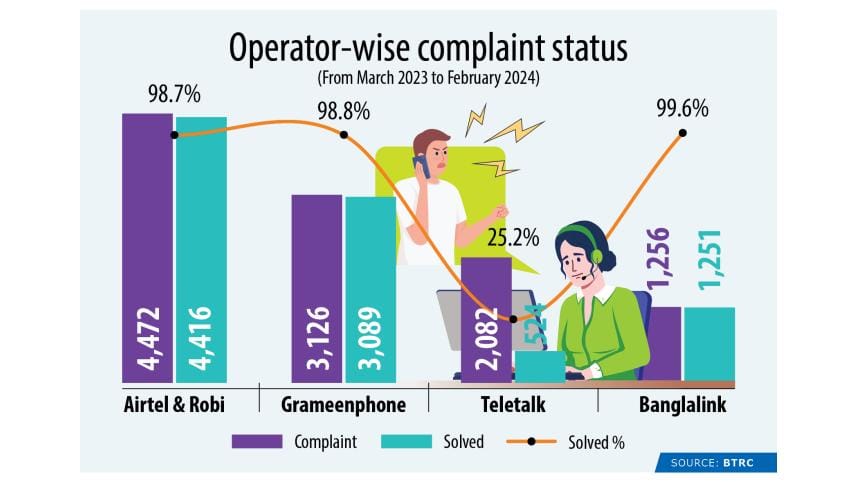Complaints bring no solutions for most Teletalk users

A staggering majority of customers of state-run telecom operator Teletalk are getting no solutions even after logging complaints through the call centre of the Bangladesh Telecommunication Regulatory Commission (BTRC).
During March 2023 to February 2024, just under 75 percent of the complaints logged through the BTRC's call centre, known as 100 (shortcode), were not resolved or are still pending a solution, according to BTRC's documents.
In other words, of the 2,085 complaints logged through the call centre, only 524 or 25.2 percent were resolved.
In the same period, private telecom operators have resolved more than 98 percent of customers' grievances.
There were 4,472 complaints filed against Robi Axiata (including Airtel), of which 4,416 or 98.7 percent were resolved.
A total of 3,126 complaints were filed against Grameenphone, of which 3,089 or 98.8 percent were resolved.
Customers logged 1,256 complaints against Banglalink, of which 1,251 or 99.6 percent, were resolved -- the highest in the industry.
The grim scenario unfolded against the backdrop of Teletalk losing customers in spite of the government spending public money amounting to thousands of crores behind its network.
In fact, Teletalk was the only operator in 2023 to lose customers. Its subscriber base narrowed by 2.3 lakh year-on-year to 64.6 lakh last year.
It now has 65.5 lakh customers.
On the contrary, the overall subscriber base in Bangladesh grew by 1.05 crore in 2023 on the back of solid performances by the other three operators.
Considering overall complaints relative to customer base, Teletalk users disproportionately filed more complaints.
From March 2023 to February 2024, 10,936 complaints were lodged through BTRC's customer centre.
Teletalk, which has 65.5 lakh customers out of a total of 193.7 million mobile subscribers in the country, holds a market share of only 3.38 percent.
However, the share of complaints against the state-run operator stood at 11.49 percent.
On the other hand, Grameenphone, which has a market share of 43.33 percent, accounted for 28.58 percent of total complaints.
Robi, with a market share of 30.21 percent, accounted for 40.89 percent while Banglalink, with a market share of 23.09 percent, accounted for 19.04 percent.
"Most customer complaints are about the lack of network coverage. We don't have enough base transceiver stations (BTS), which is why they experience this issue," said Nurul Mabud Chowdhury, managing director (additional charge) at Teletalk.
BTSs, commonly known as telecom towers, enable wireless communication by facilitating the transmission and reception of radio signals between mobile devices and the network.
"We are implementing a project to expand network coverage and are hopeful that a positive change will be visible by June next year," Chowdhury added.
Teletalk, which began its journey in December 2004 with a mission to acquire a significant market share by providing countrywide network coverage, has become a burden for the government owing to mounting losses.
As it keeps losing customers and its performance in various service metrics deteriorates, Teletalk's revival appears uncertain.
In the last financial year ending on June 30, Teletalk's total losses amounted to Tk 1,337 crore, reflecting a persistent trend of net losses since its establishment.
It only made a profit in 2010-11 and 2012-13, according to the financial report for 2022-23.
On January 13 this year, Zunaid Ahmed Palak, state minister for telecom, asked state-run telecom companies to attain profitability by June this year, warning officials that they would otherwise be shown the door.



 For all latest news, follow The Daily Star's Google News channel.
For all latest news, follow The Daily Star's Google News channel.
Comments